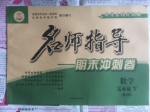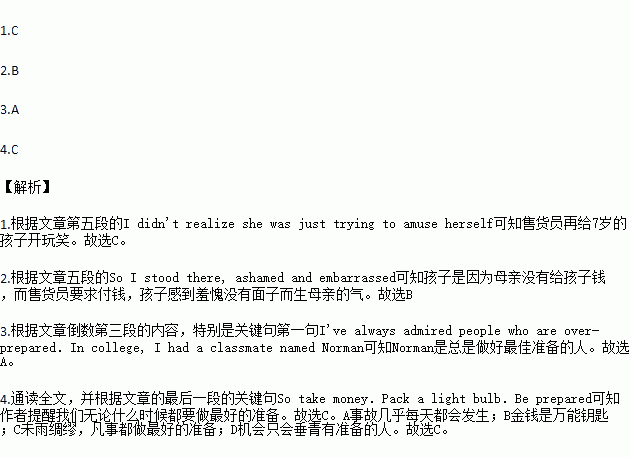题目内容
All you have is what you bring with you
I've always felt a need to be prepared for whatever situation I've found myself in.
My mother once took me to a store when I was seven years old.She and I got to the checkout counter, and she realized she had forgotten a couple of things on her shopping list.She left me with the cart and ran off to get what she needed.
"I'll be right back." she said.
She was gone just a few minutes, but in that time, I had loaded all the things on the belt and everything was rung up.I was left staring at the cashier, who was staling at me."Do you have money for me, son?" she said."I'll need to be paid." -
I didn't realize she was just trying to amuse herself.So I stood there, ashamed and embarrassed.
By the time my mom returned, I was angry."You left me here with no money! This lady asked me for the money, and I had nothing to give her I"
Now that I'm an adult, you'll never catch me with less than $200 in my wallet.I want to be prepared in case I need it.
I've always admired people who are over-prepared.In college, I had a classmate named Norman.One day he was giving a presentation on an overhead projector and in the middle of his talk, the light bulb (灯泡) on the projector blew out.We would have to wait ten minutes until someone found a new' projector.
"It's Okay." he announced."There's nothing to worry about."
We watched him walk over to his bag and pull something out.He had brought along a spare bulb for the Overhead projector.Who could even think of that?
I often told my students, " When you go into the wilderness, the only thing you can depend on is what you take with you." And essentially, the wilderness is anywhere but your home or office.So take money.Pack a light bulb.Be prepared.
1.Why did the cashier ask a seven-year-old boy to pay for the purchases'?
A.The boy was shopping by himself.
B.The boy's mother asked her to do so.
C.The cashier was playing a joke on him.
D.The boy's mother was away for something else.
2.Why was the boy angry with his mother?
A.His mother left him alone.
B.He lost face in front of the cashier.
C.His mother forgot to buy something.
D.He had just quarreled with the cashier.
3.Why did Norman bring a spare bulb with him?
A.He was always well-prepared.
B.His presentation was about bulbs.
C.He knew the classroom equipment was of poor quality.
D.He predicted the bulb on the projector would blow out.
4.What do the two stories tell us?
A.Accidents happen almost every day.
B.Money is the key that opens all doors.
C.In fair weather, prepare for a rainy day.
D.Chances favor those who are well-prepared.
 名师指导期末冲刺卷系列答案
名师指导期末冲刺卷系列答案 开心蛙口算题卡系列答案
开心蛙口算题卡系列答案
